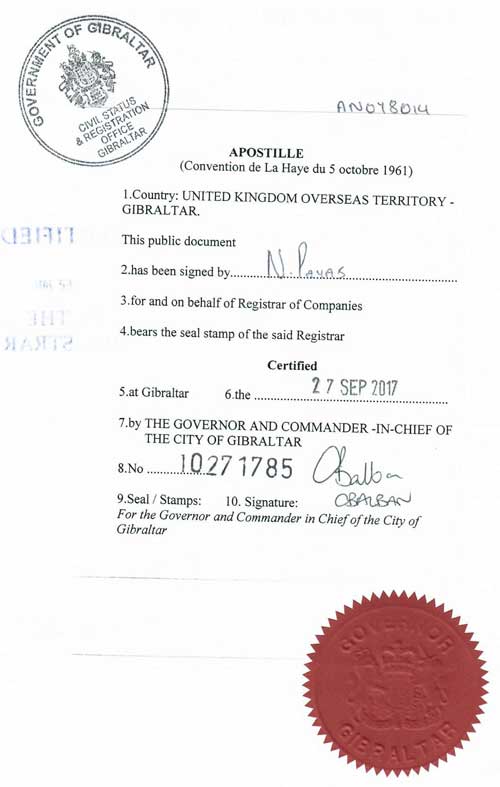
Schmidt & Schmidt covers the full spectrum of legalization services for documents issued in Gibraltar.
Gibraltar joined the Hague Convention on the Simplified Authentication of Documents together with the United Kingdom, on 21 August 1964; the Convention entered into force on 24 January 1965.
The apostille, or the “Hague apostille” is a certificate that authenticates the origin of a public document (e.g., a birth, marriage or death certificate, a judgment, an extract of a register or a notarial attestation). It confirms the authenticity of the signature and the authority of an official who signed the public document.
Since February 1, 2020, Gibraltar, together with the United Kingdom, is no longer an EU Member State. According to the withdrawal agreement, the documents from Gibraltar must be certified for use in the EU with an Apostille.
Documents issued in Gibraltar and certified with an apostille in accordance with the Hague Convention of 1961 are recognized in all Member States of the Hague Convention and do not require any other form of certification, such as consular legalization, which considerably reduces the costs and time required for the certification of documents. So far, more than 120 states have joined the Convention.
The apostille is not sufficient for use in the states that are not party to the Hague Convention. In this case, consular legalization applies to a public document.
The Convention can normally be applied to the countries that the United Kingdom submitted declarations about, i.e. in most cases - the rules apply to its overseas territories like Anguilla, Bahamas, Botswana Botswana, Falkland Islands, Gibraltar, and Guernsey.

Designated Competent Apostille Authorities in Gibraltar
In Gibraltar, the issuance of Apostilles lies within the responsibilities of the Civil Status & Registration Office, making this body the sole Competent Authority. The role of this authority is crucial in the authentication of documents for international use. To ensure the authenticity of notarial documents or other public records, the Civil Status & Registration Office endorses them with a signature and an affixed seal on the Apostille. This additional layer of verification adds a significant degree of credibility to these documents when presented abroad.
The process of obtaining an Apostille in Gibraltar is pretty straightforward. It begins with the completion of a request form, which should then be submitted to the Civil Status and Registration Office. Alongside the request form, applicants must submit all the relevant documents and the fee.
Please note, that for a document to qualify for an Apostille, it must bear the signature of a notary public officially approved by HM Government of Gibraltar. This verification process ensures that the Apostille remains a reliable and internationally recognized certification.
The apostille in Gibraltar is a square stamp in English with the obligatory heading "Apostille" and a reference to the 1961 Hague Convention in French (Convention de La Haye du 5 octobre 1961). The apostille certificate’s sides will be at least 9 centimeters long.
Types of documents
| Can be apostillized | Cannot be apostillized |
|---|---|
|
|
Specific aspects and document requirements for the apostille in Gibraltar
Gibraltar is among the 120 countries that recognize and issue apostilles in accordance with the Hague Convention of 5 October 1961. The apostille serves as a confirmation of the official status of a document.
The apostille process can vary depending on the sender and recipient country, but typically to obtain an apostille for a document in Gibraltar, you must go through the following steps:
- Obtaining the original document to be apostilled;
- Verification of the signature on the document by the authorized body;
- Issuance of an apostille on a document by an authorized body;
- Submission of the document together with the apostille in the recipient country.
This process can be time-consuming, especially if it includes multiple documents and different countries. To ensure a smooth and accurate apostille process, it is recommended to seek guidance from specialists familiar with the requirements and procedures. Their expertise can help avoid delays and errors in obtaining documents apostille.
Document requirements that might apply:
- The document must be an original or a certified copy issued by the competent authority.
- The document should contain all relevant and accurate information.
- The document must be in the official language of the issuing country or translated into the official language of the country where the apostille is sought.
- The apostille must be affixed by the designated competent authority in accordance with regulations.
The apostille is issued in a uniform format. In Gibraltar, it has the form of a printed sticker with a handwritten signature of an official, an official seal, and a hologram.
In cases where apostilles are not recognized, holders of foreign documents will need to legalize them instead. However, If the country of destination of the document recognizes and issues apostilles, then legalization is unnecessary.
Legalization of Gibraltar educational documents for use abroad
For educational documents issued in Gibraltar, such as school reports, university degree certificates, transcripts of records, enrollment certificates, and other school or university certificates, to be recognized and valid abroad, they must undergo an authentication process through legalization. It is worth pointing out that documents from Gibraltar cannot be legalized in the UK - instead, they should undergo the certification process in the relevant body responsible for that.
Gibraltar educational documents requiring legalization need to bear the endorsement of a Notary Public or another recognized signatory. Notarization plays a pivotal role in the validation of educational documents in Gibraltar, making them globally recognized and fit for use abroad. Such authentication gives documents the legal power and means they can be utilized across international borders.
In certain regions, particularly within the Commonwealth nations like Australia, Canada, South Africa, or the Bahamas, a notarial act may be readily accepted without the need for further authentication. However, for most other jurisdictions, an additional layer of validation, known as legalization, becomes imperative.
For some countries, such as the United Arab Emirates (UAE), a mere apostille is insufficient, and the notarial act must additionally bear a legalization stamp from the consulate of the destination country. This extended process, referred to as consular or chain legalization, can be more time-consuming and costly.
Consular legalization of Gibraltar documents for use abroad
Consular legalization is the process of authenticating or certifying a legal document so a foreign country's legal system will recognize it as with full legal effect that is carried out by the diplomatic or consular mission of the country in which the document is to be used.
This procedure is required when the destination country does not recognize or accept the apostille certification. One needs to submit the original document, along with any required copies or supporting materials, to the respective consular office. The consular officials will review the document, verify its authenticity, and affix their seal or stamp to certify its validity.
The consular legalization process may require additional steps like obtaining translations of the document into the language of the destination country or providing additional supporting documentation as requested by the consular office.
It is up to the diplomatic mission to decide about the authentication procedure
The specific requirements and procedures for consular legalization may vary depending on the regulations of the destination country.
The main differences between an apostille and consular legalization of documents
The common feature between apostille and consular legalization is that they authenticate an official document for presentation to institutions in another country. However, they have many differences.
| Apostille | Consular legalization | |
|---|---|---|
| Legal effect | Can be used in all countries that are party to the Hague Convention on the Simplified Legalization of Documents. | Use between States one or both of which is not a member of the Hague Convention, or where one of the contracting States has protested the accession of the other. |
| Difficulty | Moderate. To obtain an apostille, contact the competent apostille authority of the state of origin of the document. | High. For consular legalization, various inland authorities and a diplomatic mission of the state of destination must be involved. |
| Pre-certification | Usually not required. | Is obligatory. |
| Attestation at the state of destination embassy in the state of origin of the document | No need to contact the Consulate of the country of destination. | Is the final step of legalization. |
Apostille and consular legalization in all cities of Gibraltar
Schmidt & Schmidt provides apostille and consular legalization services for public documents originating from all regions across Gibraltar. We handle the entire process, from document review to obtaining the necessary certifications, ensuring that your documents are valid and recognized internationally. With our reliable services, you can confidently use your Gibraltar public documents abroad.
Procurement of documents from Gibraltar
If the important documents are lost or damaged, or current copies of the documents are needed, the re-issue of the documents is required. It is not unusual for people outside Gibraltar to encounter difficulties with obtaining new documents when abroad. Our consultants will help you procure new documents from Gibraltar remotely, and we can arrange for your documents to be sent by courier anywhere in the world.
Certified translation of documents from Gibraltar
Copies and transcripts of civil status documents can be translated into any language by a sworn translator in Gibraltar or the translation can be done in the country of destination. We offer certified translations of civil status documents with further certification. The cost of the work is calculated according to the volume of the document in question.
Does the translation have to be apostillized?
Any foreign document issued in one country and used in another country must be legalized for use abroad. Therefore, the authenticity of a certified translation from Gibraltar needs to be certified by an apostille. Consequently, many authorities may not accept certified translations from Gibraltar if the translation has not been properly authenticated in Gibraltar for use abroad. To avoid this confusion, translations should better be made in the state of the destination of the document.

























































